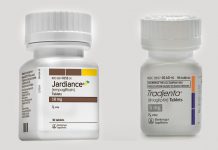New research from the University of East Anglia, Norwich, England, has found that a diabetes drug helped people with heart failure, suggesting that it could revolutionize heart failure treatment, according to Science Daily.
Previous studies have shown that sodium-glucose co-transporter-2 (SGLT2) inhibitors, which are used for the treatment of diabetes, could help about 50% of heart failure patients, especially those who have a condition called the reduction ejection fraction.
However, the new study found that SGLT2 inhibitors could be beneficial for all heart failure patients, including those with preserved ejection fraction.
The drug could offer a real benefit in terms of improving outcomes for these patients, with the researchers saying it will revolutionize heart failure treatment options.
Lead author Prof. Vass Vassiliou said, “Heart failure is a condition where the heart is not pumping as well as it should, and it affects about one million people in the UK.”
“There are two types of heart failure. Heart Failure with a reduction in ejection fraction happens when the heart is unable to pump blood round the body due to a mechanical issue,” he explained. “And heart failure with preserved ejection fraction happens when, despite the heart pumping out blood well, it is not sufficient to provide oxygen to all the parts of the body. Patients are equally split between the two types of heart failure.”
Prof. Vassiliou further explained, “For many years there was not a single medicine that could improve the outcome in patients with the second type of heart failure — those patients with preserved ejection fraction. This type of heart failure had puzzled doctors, as every medicine tested showed no benefit.”
“One class of heart medication, called SGLT2 inhibitors, was initially used for patients with diabetes. However, it was noticed that it also helped patients who had heart failure,” he added. “Previous studies had shown that this medication would be beneficial in heart failure with reduced ejection fraction. But we found that it can also help heart failure patients with preserved ejection fraction.”
Commonly used SGLT2 inhibitors include dapagliflozin (Forxiga), canagliflozin (Invokana), and empagliflozin (Jardiance).
The researchers looked at all studies published in the field and brought together data from almost 10,000 patients. Using statistical modeling, they showed the specific effect of these diabetes medicines.
Prof. Vassiliou said, “We found that patients taking SGLT2 inhibitors were 22% less likely to die from heart-related causes or be hospitalized for heart failure exacerbation than those taking placebo. This is very important because this is the first medication that can provide a benefit to this previously untreatable group of patients — in terms of heart-related deaths or hospitalization.”
“This is the first medication that can really improve the outcomes for this patient group and it will revolutionize the treatment offered to heart failure patients,” he added.
The article was published in Science Daily.





















